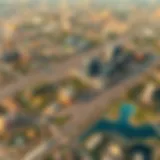Ras Al Khor Industrial Area Three: Insights & Impact
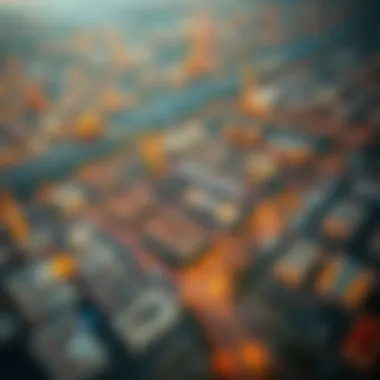

Intro
Ras Al Khor Industrial Area Three represents a pivotal section of Dubai's bustling industrial hub. Situated conveniently near the Dubai Creek, this area showcases the dazzling blend of modern infrastructure and purposeful design. Understanding the intricacies of this locale goes beyond mere geographical data; it is about grasping its role in Dubai's economic narrative and its significance to various stakeholders, from planners to residents and business owners.
As we navigate through the architectural styles, community dynamics, and future potential of this area, it’s important to recognize how these elements intertwine to create a vibrant industrial ecosystem. The area is not just a collection of warehouses and factories; it embodies the pulse of commerce, innovation, and community engagement. With this guidance, readers can glean insights into the underlying features, lifestyle factors, and environmental considerations that shape Ras Al Khor Industrial Area Three.
Neighborhood Features
Landscaping Highlights
The landscaping in Ras Al Khor Industrial Area Three is an interesting blend of functionality and aesthetic appeal. The layout boasts of greenery amid busy industrial facilities. Native plants are often used, not only for their resilience but also to preserve the local ecology. There are pockets of landscaped areas that serve as important green lungs, helping to mitigate the urban heat while offering places of rest for workers and residents alike.
Architectural Styles
The architecture within Ras Al Khor Industrial Area Three varies significantly, reflecting the area’s practical needs along with contemporary design principles. The structures are primarily industrial, featuring functional designs that prioritize efficiency. However, some buildings incorporate modern architectural elements, with large glass facades that cater to showrooms or offices within these premises. Traditional elements are rare, but occasional touches can be found to remind one of Dubai’s rich legacy.
Community Life
Local Events and Activities
While primarily an industrial zone, Ras Al Khor Industrial Area Three does not lack in community spirit. On regular occasions, local communities host events ranging from trade fairs to sustainability workshops. These gatherings aim to foster relationships between businesses and residents, promoting a sense of togetherness. The talks and exchanges at these events often revolve around improving city living, sustainability, and innovation.
Lifestyle Amenities
Ras Al Khor’s industrial setting does not overshadow the availability of essential lifestyle amenities. Within proximity, one can find various dining options that cater to a diverse palate, serving everything from fast food to fine dining. Furthermore, small markets and convenience stores ensure that residents have easy access to daily necessities. Fitness centers and recreational spaces are also becoming vital as the area develops, with more attention directed toward the quality of life for those who work and live in this industrious environment.
“The rhythm of Ras Al Khor Industrial Area Three is not solely about production; it’s about community cohesion and economic resilience.”
As we delve deeper into the prospects of Ras Al Khor Industrial Area Three, the interplay between its infrastructural development and community life emerges as a focal point in understanding its future direction. The commitment to fostering a robust yet flexible industrial landscape will surely make it a key player in shaping Dubai's economic fabric.
Preamble to Ras Al Khor Industrial Area Three
The Ras Al Khor Industrial Area Three represents a cornerstone in Dubai's industrial framework. This region has swiftly evolved into a bustling hub of commercial activity. It plays a pivotal role not only in driving economic growth but also in shaping the urban landscape of the emirate.
This area is crucial for various reasons. First and foremost, it supports a multitude of industries, enhancing Dubai's diverse economic fabric. The industrial zone's strategic planning allows for optimal logistics and connectivity, making it a prime location for businesses looking to thrive in a competitive environment. Investors and entrepreneurs are drawn here due to the supportive regulatory framework and rapid infrastructure development.
Historical Context
Ras Al Khor has a rich historical tapestry that intertwines traditional commerce with modern industrialization. Initially, the area was primarily known for its fishing and pearling activities. Over the decades, as Dubai transitioned into a global city, the need for industrial expansion prompted developments in this region. The establishment of Ras Al Khor Industrial Area Three marked a significant shift toward manufacturing and heavy industries, reflecting Dubai's ambition to diversify its economy beyond oil reliance. This shift fueled the area’s growth and established it as a critical player within the region.
Geographical Location
Geographically, Ras Al Khor's location is advantageous, nestled near major highways and points of entry. Convenient road access ties it to Dubai's larger transport networks, including the Sheikh Mohammed Bin Zayed Road. The proximity to the Dubai International Airport and Jebel Ali Port cannot be overstated; local firms enjoy easy access for import and export activities. This positioning creates a logistical backbone, enabling a seamless flow of goods and services. Additionally, the area's landscape, which blends industrial zones with green spaces and wetlands, highlights its strategic planning.
The seamless infrastructural design fosters an environment ripe for economic ventures, making the Ras Al Khor Industrial Area Three a beacon of opportunity.
Economic Significance
The Ras Al Khor Industrial Area Three holds a vital position in Dubai's economic framework. Its geographical placement, combined with its industrial capacities, fosters an environment ripe for growth and innovation. This area serves not just as a hub of industry, but also as a cornerstone in bolstering Dubai's economic standing on the global stage. By dissecting its contributions to the local economy and identifying the key industries present, one can gain a clearer picture of why this locale is indispensable.
Contribution to Dubai's Economy
As a buzzing center for various industries, Ras Al Khor Industrial Area Three significantly fuels Dubai's economic engine. The sprawling industrial landscape supplements the supply chain, contributing to the emirate's aspirations to be a leading global hub for business and commerce. According to recent reports, areas like this contribute substantially to the Gross Domestic Product (GDP) of Dubai, enabling robust economic growth.
"An effective industrial zone not only aids in economic expansion but also generates considerable employment opportunities for skilled workers."
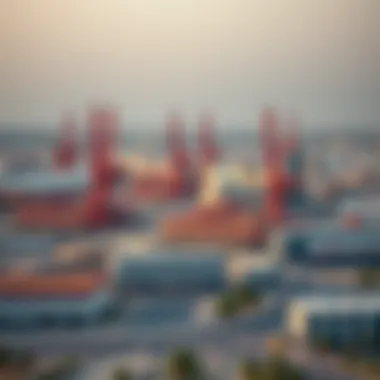
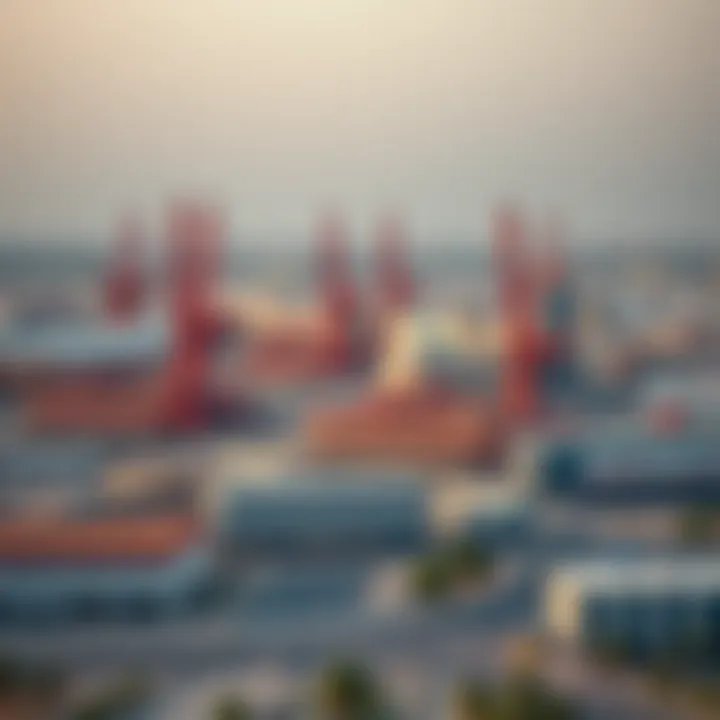
Whether it’s attracting foreign investment or nurturing local enterprises, the area exemplifies how industrial zones can catalyze development. With a growing emphasis on diversifying economies, Ras Al Khor invites various businesses to plant roots, resulting in beneficial synergies and collaborations among sectors.
Key Industries in Area Three
Delving into the specific industries in Ras Al Khor Industrial Area Three reveals a diverse tapestry that is both fascinating and integral to the local economy. Here are some standout sectors:
- Logistics and Warehousing: The perfect location near major transport routes makes it a natural choice for logistics firms, enhancing efficiency in shipping and receiving goods.
- Construction: Given Dubai's continuous expansion, the construction sector flourishes here, with numerous firms taking advantage of the proximity to both materials and markets.
- Manufacturing: Various types of manufacturing—ranging from electronics to textiles—benefit from the area's skilled labor and industrial infrastructure.
- Oil and Gas: This industry plays a critical role, given the region's resources, attracting companies that want to extract and process energy sources efficiently.
- Food Processing: The rise in demand for food products has led to increased activity in food production and processing, meeting both local and export needs.
This variety creates a robust network supporting each industry's growth. Not only does it provide goods and services, but it also intertwines with local culture, encouraging the emergence of new businesses and services that cater to the community's needs. Overall, the collective strength of these industries propels Ras Al Khor Industrial Area Three into a prominent role in Dubai's economic landscape.
Infrastructure Overview
The infrastructure of Ras Al Khor Industrial Area Three serves as the backbone of its economic activities and social interactions. A well-developed infrastructure is vital not just for efficient business operations but also for enhancing the quality of life for all residents and visitors. It encompasses transportation networks, utilities, and various services, forming a cohesive system that supports the area’s industrial activities. Understanding this infrastructure sheds light on how integral it is to the growth and sustainability of this vibrant locale.
Transportation Networks
Transportation in Ras Al Khor Industrial Area Three warrants a closer look due to its role in connecting industries, communities, and the broader Dubai area. The thoroughfares here are not merely routes; they are arteries that deliver the lifeblood of commerce and connectivity.
- Roadways: The area benefits from an extensive network of roads, notably the Sheikh Mohammed bin Zayed Road and Al Ain Road, allowing easy access for heavy vehicles. This accessibility is crucial for industries that rely on the timely movement of goods, minimizing delays and enhancing productivity.
- Public Transport: Additionally, public transport options like buses and expansions in metro services are pivotal. The Dubai Metro's expansion aims to cover areas surrounding Ras Al Khor, improving connectivity and making it easier for the workforce to commute. The introduction of reliable modes of public transport lessens congestion and provides eco-friendly travel options.
- Freight Links: The proximity to Dubai's ports enhances logistic advantages. Import and export businesses benefit from quick transportation channels, with sea routes, and the Al Maktoum International Airport nearby facilitating international trade. This aspect has rapidly positioned Area Three as a strategic hub within the emirate.
Overall, these transportation networks are fundamental in supporting the diverse workforce and business operations in Ras Al Khor Industrial Area Three, ensuring smooth transitions for both freight and personnel.
Utilities and Services
Utilities and services play an equally important role in ensuring that Ras Al Khor Industrial Area Three functions efficiently. A reliable utility infrastructure promotes development and sustains day-to-day activities.
- Water and Electricity Supply: The area has access to robust water and electricity services, crucial for industrial entities and residential needs alike. Facilities operate under the comprehensive management of the Dubai Electricity and Water Authority (DEWA), ensuring that demands are met without undue strain.
- Telecommunications: In a world heavily reliant on communication, telecommunication services are state-of-the-art in the area. High-speed internet and mobile connectivity not only support businesses' operational needs but also connect the community efficiently. This aspect cannot be overstated, given that the modern economy thrives on constant communication.
- Waste Management: Lastly, the waste management system operates efficiently, with initiatives focusing on recycling and sustainability efforts. Safe disposal and recycling facilitate a healthier environment while ensuring that industrial activities adhere to regulatory standards.
In sum, the utilities and services infrastructure in Ras Al Khor Industrial Area Three is a mixture of modern efficiency and sustainability practices, catering well to both business operations and their surrounding community. Through this framework, the area positions itself not only as an industrial leader but as a burgeoning community that respects environmental values while pursuing economic growth.
“An efficient infrastructure is the foundation upon which successful industries are built.”
Environmental Considerations
Understanding the environmental considerations surrounding Ras Al Khor Industrial Area Three is vital for several reasons. As this industrial hub burgeons, it inevitably affects the ecosystem in which it operates. Thus, discussions about sustainability and ecological balance are paramount for ensuring that growth does not come at the cost of environmental degradation. This section focuses on sustainability initiatives in the area and the impacts on local wildlife.
Sustainability Initiatives
In Ras Al Khor Industrial Area Three, sustainability is not just a trend; it's a foundational principle driving development. Organizations and authorities are actively rolling out various sustainability initiatives, aimed at reducing the carbon footprint and promoting eco-friendly practices. Some of these initiatives include:
- Water Conservation Programs: Water recycling systems are implemented to optimize water usage in factories and enterprises, ensuring minimal wastage.
- Green Building Standards: Many new constructions within the area adhere to green building codes, promoting energy efficiency and utilizing sustainable materials.
- Waste Management Strategies: The area employs advanced waste segregation and recycling practices to lessen landfill contributions, pushing forward a zero-waste goal.
All these measures not only foster a hospitable environment for businesses but also pave the way for the community to thrive sustainably. As the phrase goes, "A stitch in time saves nine," hence addressing these issues proactively is essential for long-term viability.
Impact on Local Wildlife
Ras Al Khor Industrial Area Three is situated in proximity to sensitive ecological zones, particularly the Ras Al Khor Wildlife Sanctuary. This sanctuary is home to a variety of species, including migratory birds, making it critical to assess the industrial area's impact on local wildlife.
The challenges include:
- Habitat Disruption: Expanding infrastructure may disrupt established habitats, driving some local species to alter their natural behaviors or relocate altogether.
- Pollution Concerns: Increased industrial activity could lead to air and noise pollution, which could be detrimental to sensitive wildlife.
- Mitigation Efforts: Various measures are in place to mitigate adverse effects, such as creating buffer zones and conducting environmental impact assessments before initiating projects. Special wildlife corridors are often designed to ensure that animal populations can thrive despite urban encroachment.
The preservation of local wildlife is not just about aesthetics or conservation; it’s about maintaining the biological richness that sustains our ecosystem. In Ras Al Khor, every habitat is a cog in the environmental wheel, crucial for our climate and well-being.
In summary, the ongoing commitment to sustainable practices in Ras Al Khor Industrial Area Three reflects a growing consciousness about balancing industrial growth with environmental stewardship. Addressing these considerations head-on serves not only the industrial stakeholders but also ensures that the surrounding ecosystems continue to flourish, not just for today but for generations to come.
Community Aspects
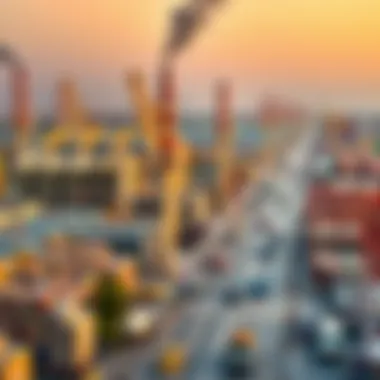
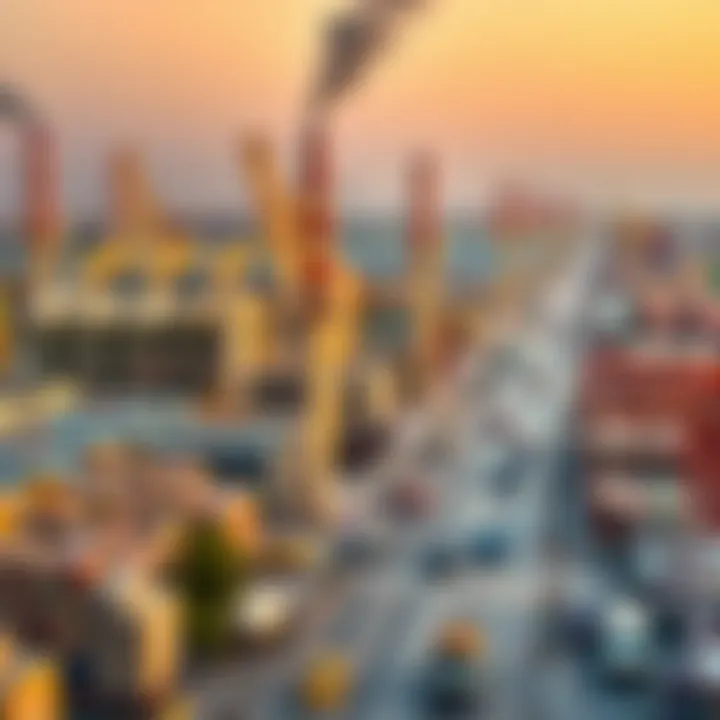
In any urban development, understanding community aspects is essential. In Ras Al Khor Industrial Area Three, this concept embodies the essence of social interaction, residential functionality, and cultural richness. The community here is not merely a backdrop for industrial pursuits; it actively shapes the environment and the lives of those within it. A blend of economic activities and community life creates a unique landscape that reflects both growth and stability.
Residential Options
Living options in Ras Al Khor Industrial Area Three underline the distinct character of the area. From condominiums to villas, there’s a variety to suit different lifestyles. High-rise buildings house individuals seeking convenience and accessibility, while residential complexes often cater to families looking for community-driven environments.
Moreover, affordability plays a key role in the attractiveness of these residential choices. The presence of diverse price points ensures that people from all walks of life can find a home here, contributing to a vibrant community mix.
Some notable residential areas include:
- Al Quoz: Known for its more budget-friendly offerings, this area appeals to young professionals.
- Dubai Sports City: This neighborhood is family-oriented, with parks and amenities that foster a sense of community.
- Living in proximity to workplaces: Residents often appreciate the benefits of reduced commute times, which adds to the overall appeal of residing in the industrial area.
The significance of these residential options goes beyond mere convenience; they encourage a community spirit where collaboration and interaction thrive.
Social and Cultural Activities
Ras Al Khor Industrial Area Three is not just about business and housing; it also pulses with social and cultural activities that enrich the lives of its residents. The residents engage regularly in various events and activities, revealing a tapestry of social networks that contribute to communal harmony.
Considering the multicultural backdrop of Dubai, social and cultural activities here are quite diverse. From community gatherings to cultural festivals, these events help foster a sense of belonging and inclusivity. Notable highlights include:
- Monthly markets showcasing local produce and crafts, where residents come together to buy, sell, and socialize.
- Art exhibitions held in collaboration with local artists, turning empty industrial spaces into galleries, enriching the cultural fabric of the area.
- Sports leagues that bring together people of different ages, promoting both health and camaraderie.
These activities play a significant role in shaping the community identity; they break barriers between varying cultural backgrounds. Community initiatives—whether they’re organized by resident councils or informal groups—add layers of connectedness among the residents, making Ras Al Khor Industrial Area Three not just a place to live and work, but a vibrant community rich in social interactions and cultural exchanges.
"In the heart of industry, we find the true essence of community. It thrives not only in the structures we build, but in the relationships we foster."
In summary, the community aspects of Ras Al Khor Industrial Area Three highlight the spirit of collaboration, diversity, and collective growth, making it an intriguing case for urban planners and residents alike.
Challenges and Opportunities
Understanding the challenges and opportunities within Ras Al Khor Industrial Area Three is crucial for stakeholders, including homeowners, visitors, planners, and architects. The landscape here is constantly shifting, influenced by both economic conditions and regulatory frameworks. As we explore these elements, we can draw a holistic picture of what this area offers and the hurdles it must overcome.
Economic Fluctuations
The economic climate in Ras Al Khor Industrial Area Three often reflects broader trends within Dubai and the global market. Fluctuations in demand for industrial goods can lead to peaks and troughs in business activity. For instance, the aftermath of the COVID-19 pandemic showed how swiftly fortunes could change. Industries previously thriving found themselves at a standstill, while others pivoted to meet new demands, such as logistics and healthcare-related sectors.
Factors influencing economic fluctuations include:
- Global Market Trends: Changes in international trade policies or economic conditions in partner countries can greatly affect local industries.
- Supply Chain Disruptions: The movement of goods is often hampered by unforeseen events, impacting production rates and revenues.
- Local Competition: The rise of emerging businesses within the region forces existing companies to innovate and adapt, potentially leading to increased resilience.
Such fluctuations may lead to temporary setbacks but can also spur strategic planning and entrepreneurship, paving the road for more robust economic practices.
Growth Prospects
Looking ahead, Ras Al Khor Industrial Area Three presents a landscape replete with potential growth opportunities. The vision for the future encompasses diversification of industries and enhancement of infrastructural capacities. Analysts predict that areas such as technology, green energy, and smart manufacturing will play pivotal roles in shaping its growth trajectory.
Some promising aspects of growth in this area include:
- Technological Advancements: The adoption of Artificial Intelligence and automation can streamline operations and improve efficiency across various sectors.
- Sustainability Initiatives: Increasing focus on environmentally friendly practices can attract investments and enhance the area's appeal. Businesses integrating such methods often benefit from favorable government policies and public perceptions.
- Strategic Location: Situated near main transportation hubs, Ras Al Khor can leverage its geographic advantages to enhance trade routes, thus increasing business potentials.
As potential investors and decision-makers look at Ras Al Khor Industrial Area Three, the interplay between challenges and opportunities will serve as a barometer for growth. It may seem daunting at times, but with calculated strategies, the area can evolve into a flourishing hub, reflecting the ambitious spirit of Dubai itself.
Facing challenges can often lead to unexpected opportunities, creating a platform for growth and innovation.
Regulatory Framework
The regulatory framework surrounding Ras Al Khor Industrial Area Three plays a crucial role in shaping its development and economic viability. This framework sets the stage for how industries operate while helping ensure sustainable growth and compliance with environmental standards. For a thriving industrial area like Ras Al Khor, the connection between governance and business is vital. It provides clarity on what businesses can expect, ensuring that they can operate efficiently while also meeting legal and social responsibilities.


Government Policies Impacting Development
Policies implemented by the Dubai government significantly influence the landscape of Ras Al Khor Industrial Area Three. They focus on stimulating economic growth, fostering innovation, and creating a conducive environment for various industries. These policies can range from tax incentives to infrastructure development initiatives.
For instance, the Dubai Economic Department often rolls out initiatives encouraging businesses to invest in the industrial sector, offering reduced licensing fees or expedited processing times for permits. Additionally, the government's long-term vision, such as the Dubai 2040 Urban Master Plan, aims at integrating industrial, residential, and commercial spaces planning to enhance livability while making it easier for businesses to thrive.
Key policies that impact development include:
- Investment Opportunities – Attracting foreign and local investment through various incentives.
- Infrastructure Development – Enhancing logistics and transportation networks to support industrial growth.
- Sustainability Measures – Mandates for eco-friendly practices to preserve the environment, ensuring alignment with global sustainability goals.
Compliance and Regulations
Maintaining compliance with regulations is not just about following the law; it’s about being proactive in enhancing business practices. For businesses operating in Ras Al Khor Industrial Area Three, understanding the compliance landscape is essential for risk mitigation and long-term success.
The regulatory bodies oversee local businesses to ensure activities are aligned with approved standards. A typical regulatory checklist includes inspections for safety standards, licenses related to environmental regulations, and adherence to zoning laws to ensure harmonious development. Business owners must be familiar with the following:
- Health and Safety Regulations: Ensuring a safe working environment for employees.
- Environmental Compliance: Following laws related to emissions, waste management, and resource use.
- Operational Licensing: All businesses must renew their trade licenses annually and meet specific criteria set forth by local authorities.
"In the world of business, understanding the rules of the game isn't just a formality; it can mean the difference between success and failure."
In summary, compliance and regulations serve as the backbone of Ras Al Khor Industrial Area Three’s operational framework. By comprehending these elements, businesses are better positioned to adapt and thrive in a fast-evolving industrial environment.
Future Developments
Future developments in Ras Al Khor Industrial Area Three represent a significant chapter in its ongoing evolution. As Dubai continues to solidify its status as a global hub for commerce and industry, pushing ahead with smart growth is critical. These developments not only aim to enhance economic resilience but also focus on sustainable practices that could serve as a model for other urban centers.
Planned Projects
The line-up of planned projects is quite impressive, promising to reshape the geographic and economic landscape of Ras Al Khor Industrial Area Three. Noteworthy initiatives include:
- Tech Parks and Innovation Hubs: Aiming to attract tech companies focusing on AI and IoT technologies, these facilities will cater to startups and established businesses alike, creating a dynamic ecosystem for creativity and innovation.
- Logistics and Warehousing Centers: Given its prime location, enhanced logistics infrastructure will aim to streamline supply chain functions, providing companies with easy access to major highways and shipping routes.
- Green Building Initiatives: As part of Dubai's commitment to sustainability, several projects will prioritize eco-friendly designs that reduce carbon footprints while contributing to long-term cost savings for businesses.
These planned projects are not merely constructions; rather, they possess the potential to stimulate job growth, attract foreign investment, and enhance the community's overall quality of life. Local stakeholders are keenly observing these developments, anticipating the positive impact they will yield.
Vision for Growth
The vision for growth in Ras Al Khor Industrial Area Three is underpinned by the objective of creating a balanced economic landscape while remaining sensitive to environmental concerns. City planners are focused on:
- Holistic Economic Integration: Creating synergies between various industries, encouraging businesses to collaborate rather than operate in isolation. Such integration is expected to foster innovation and maximization of resources.
- Community Development: Ensuring that as businesses grow, residential areas also develop, resulting in a well-rounded community where work-life balance is achievable.
- Sustainability as a Core Principle: Future planning will embed sustainable practices into the very fabric of the area. The aim is to cultivate a reputation as a model for responsible industrial development globally.
This forward-thinking approach could turn Ras Al Khor Industrial Area Three into a beacon of progress—an area where cutting-edge industries flourish in harmony with robust environmental stewardship. As these plans unfold, all eyes will be on the collaborative efforts between government entities and industry leaders, showcasing the true power of shared visions.
Ending
In wrapping up our exploration of Ras Al Khor Industrial Area Three, it’s essential to take a moment to reflect on why this topic is indeed significant. As an integral part of Dubai's expansion and diversification, the industrial area not only showcases the city’s growth but also highlights the interconnections between various economic sectors, infrastructure, and community development.
Summary of Key Insights
Throughout this article, we discussed several notable aspects of Ras Al Khor Industrial Area Three:
- Economic Contribution: The area plays a vital role in bolstering Dubai’s economy through key industries like logistics, manufacturing, and trade. Its strategic positioning aids in attracting businesses and investors.
- Infrastructure and Accessibility: Transport networks, such as roads and proximity to the Dubai International Airport, enhance the operational efficiencies for businesses, enabling seamless movement of goods and services.
- Environmental Responsibility: With increasing attention on sustainability, various initiatives are in place to minimize environmental impact, notably regarding local wildlife and ecosystems.
- Community Engagement: The interplay of residential options and social activities enriches the lives of those in the vicinity, making the area a desirable place for families and professionals alike.
The interrelationship of these elements makes Ras Al Khor Industrial Area Three not just an industrial hub but a living part of a community striving towards future growth.
Final Thoughts on Ras Al Khor Industrial Area Three
Ras Al Khor Industrial Area Three stands as a testament to Dubai’s vision for a diversified economy and robust urban planning. It is more than just a collection of warehouses and factories; it reflects the dynamic spirit of a city eager to innovate and grow.
For homeowners, visitors, planners, and architects, understanding this area is crucial in appreciating the comprehensive landscape of Dubai. As new projects unfold and the vision for growth takes shape, keeping an eye on developments in this industrial area will be imperative to grasp the shifts in economic trends and community evolution.
"In every industry’s evolution, there is a story of adaptation, growth, and sustainability; Ras Al Khor Industrial Area Three captures this narrative beautifully."
By being attuned to these elements, stakeholders can better navigate the complexities of urban development and economic planning, ensuring a vibrant future for this pivotal section of Dubai.














